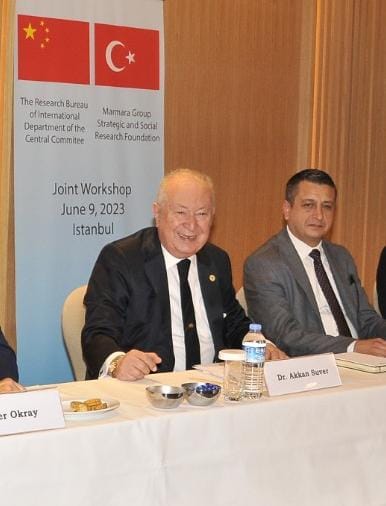The Members of the Central Committee of China at the Marmara Group Foundation
Under the leadership of Su Zuhui, the Head of the International Research Department of the Central Committee of China, a delegation consisting of Zou Guoyu, Liu Yuwenshi, and Zhang Tianqi conducted a workshop at the Marmara Group Foundation on the topics of the Belt and Road Initiative, Turkey's Century, and expectations from China. Jia Jian from the Consulate General of the People's Republic of China in Istanbul also attended the workshop.
The Marmara Group Foundation was represented by a delegation including Dr. Akkan Suver, Sezgin Bilgiç, Prof. Dr. Nedret Kuran, Prof. Dr. Özgür Çengel, Prof. Dr. Uğur Özgöker, Prof. Dr. Figen Yıldırım, Cafer Okray, Lale Aytanç Nalbant, Mahmut Saklı, Oğuzhan Ceylan, Mustafa Ergin and Lawyer Murat Keçeciler. Below is the speech delivered by Dr. Akkan Suver during the workshop:
.jpg)
“First of all, welcome to our country.
We are honored to be together with you on the 100th anniversary of the Republic of Türkiye and the 10th anniversary of the Belt and Road Initiative. My colleagues and I are delighted to have the opportunity to learn from your valuable thoughts in this small workshop we have organized today.
With your permission, allow me to first introduce Marmara Group Foundation.
Marmara Group Foundation is an international think tank that has been in existence for 38 years. For the past 26 years, we have been organizing the Eurasian Economic Summits without interruption. The People's Republic of China is also a fellow participant in the Eurasian Economic Summits.
Another important feature of the Marmara Group Foundation is its high emphasis on the Belt and Road Initiative for the past ten years.
Yes, as the Marmara Group Foundation, we attach great importance to the Belt and Road Initiative.
I would like to begin my words with a Chinese proverb: "We are not friends because we do business, but we do business because we are friends."
I evaluate the Belt and Road Initiative, which laid its foundations ten years ago, within the framework of this proverb.
This initiative is a significant step towards global development, global security, and a global civilization project, leading towards stability and trust.
The Belt and Road Initiative, which will enable people to live together despite their differences, is a product of shared responsibility and collective consultation.
Furthermore, I consider the Belt and Road Initiative as a great peace movement.
Looking at the Belt and Road Initiative merely as trade, economy, and money movement would be an incomplete assessment. It is also wrong to view this initiative solely as a transportation or logistics project.
With this project, new and advanced technology industries such as digital and green sectors will come into play. Through a broader perspective, languages will learn other languages, religions will learn other religions, cultures will learn other cultures, and people will get to know one another.
This recognition will open the door to social richness.
With the emergence of this social richness, a wide area of stability will be created in the Belt and Road region, providing a great opportunity for lasting peace.
When I look at this Belt and Road initiative from the perspective of Türkiye, here is what I see:
First, we need to look at the People's Republic of China.
Today, one-third of the world's global growth is contributed by your country's economy.
Türkiye is one of the first countries to participate in the Belt and Road Initiative (BRI), led by China, which covers the continents of Asia, Africa, and Europe. In November 2015, the two countries signed a Memorandum of Understanding on the Harmonization of the Belt and Road Initiative led by China and Türkiye’s Middle Corridor Initiative. In the following years, President Erdogan and Chinese President Xi Jinping stated the need for the integration of these two complementary initiatives. However, despite the verbal support of the leaders of both countries, Türkiye’s expectations from Chinese investments have not been realized so far, and the harmonization of the Middle Corridor and the Belt and Road Initiative has not reached the desired level.
Türkiye aims to become a transportation and logistics hub that connects the producers and markets of Europe and Asia, taking advantage of its geographical location, while also aspiring to play a central role in the global value chain. In line with these goals, the country's leaders are working to develop transportation, telecommunications, and energy infrastructure. While giving priority to road transportation and highway construction in the field of transportation, Türkiye has also completed two high-speed railway investments between Ankara-Istanbul and Ankara-Konya. At this point, Türkiye expects China, which has the world's largest high-speed train network by far, to play a key role.
We are expecting Chinese investments, as Türkiye’s share in Belt and Road Initiative-related projects is very low. Apart from Istanbul Kumport Port and Hunutlu Thermal Power Plant, China does not have significant investments in Türkiye. Between 2013 and 2020, Türkiye’s share in Chinese investments was 1.31%, while in Belt and Road Initiative projects, this rate drops to 0.8%. According to the China Global Investment Tracker, as of 2023, the total amount of Chinese investments in Turkey is $5.11 billion dollars. Considering that
These are my thoughts.
In summary, we attach great importance to the Belt and Road Initiative, which we see as the project of the era, and the development of China-Türkiye relations. Taking this workshop as an opportunity, we once again welcome you and want you to know that we, as civil society representing Türkiye, are honored to be part of the Belt and Road initiative.”
.jpg)


